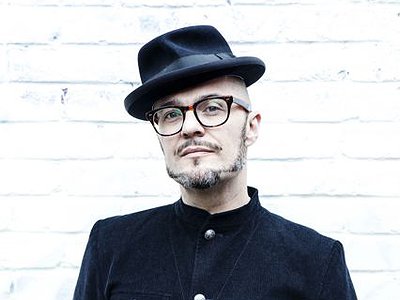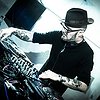Name: Justin Robertson
Nationality: British
Occupation: Rave Pilot, Record Maker & Artist
Bands/Projects: Justin Robertson's Deadstock 33s (previously Lionrock, The Prankster, Revtone, Gentleman Thief)
Labels: Skint/BMG
Musical Recommendations: Lets here it for Morgan Hammer and Lokier, singularly or collectively as She Made Monster
When did you start DJing - and what or who were your early passions and influences?
I’ve been an obsessive record buyer since I was a teenager, and was always happy to inflict my taste on people at parties, so I guess DJing was a natural career path! I went to Manchester University in 1986 with a mixed crate of indie, rock'n'roll and reggae. Finally being old enough to go to nightclubs without forging my ID, I was introduced to House music by my mate Eddy and the DJing skills of MP2 (Mike Pickering and Martin Prendergast) at the Hacienda. I went out A LOT at university and resolved to become a DJ. I think my first ‘gig’ was a student party where I played all night by turning the volume up and down on two separate ‘music centres’. Subsequently I played at a lot of student-based events, and did both the Revolutionary Communist party and the Socialist Workers' Christmas parties, so I cornered the Marxist- Leninist market. Eddy and I would put on parties in hired out nightclubs too. We’d play a mixture of funk, house and Euro-electro numbers. After I landed a job at Eastern Bloc records I would harass any promoter who came in for a gig, and ended up playing at Konspiracy under the Corn Exchange in Manchester. Since then it's been relentless fun.
For most artists, originality is first preceded by a phase of learning and, often, emulating others. What was this like for you? How would you describe your own development as an artist and the transition towards your own style?
I’ve never been a purist musically, so I think I took inspiration from various places. I guess that’s why early on I was attracted to the “Balearic” sound, or at least to the open-minded playlists I used to read about in Boy's Own fanzine. So I tended to pick bits from here and there, and try and make sense of it without it being too jarring. After a while I just relaxed a bit and found my own vibe, but I still remain a fan and think I still find inspiration from others, that process hasn’t stopped.
What were some of the main challenges when starting out as a DJ and how have they changed over time? What is it about DJing, compared to, say, producing your own music, that makes it interesting for you?
When I started there really wasn’t much of a DJ culture, in the way you understand it now. It wasn’t particularly well-paid, it had kudos, but none of this ridiculous ‘superstar’ nonsense. It was quite a nerdy thing to be into if you weren’t one of those mainstream club DJs who talked between records!
The advantage to being around in the early days was the ability to do your own thing, or start your own night without any expectations or pre-conceptions, no one wanted to be a DJ back then. It was also quite hard, you had to hunt for music, hang out in the record store waiting for the import box to arrive. I had the advantage of working in the shop, but it was the most exciting part of the day, a proper feeding frenzy! With the not inconsiderable cost of decks, it added up to a lot of financial commitment at a time when I was earning very little money. As the culture grew and morphed into something like we recognise today, then the possibilities grew too. I got into production through total bluff. I did a remix for a band signed to Eastern Bloc’s label called Mad Jacks. They wanted to get a dance remix done, as that was becoming a vogueish thing to do. I volunteered, having never been in a studio in my life. Again, a recording studio was a very rarefied environment back then, no laptops, no home set-ups, no plug-ins… Luckily I had an amazing teacher in Mark Stagg, he engineered the early sessions and taught me the ropes. DJing and production feed off each other, it's like two strands in the same story, but DJing is really about sharing, like a ravey show and tell.
What was your first set-up as DJ like? How has your set-up evolved over the years and what are currently some of the most important pieces of gear for you?
As I said in the first question, my first gig was using two music centres in a student party, but I saved up for a couple of Technics 1200s. They were madly expensive, which was really hard in the beginning and I had a terrible cheap mixer. My first few gigs were a mystery to me. I’d never seen a mixer before, but I bluffed it with reasonable success.
I remember I used to go round to Jon Da Silva’s house in Moss Side, and watch him mixand try and have a go myself. Things have certainly changed! Now I play off usb generally, although vinyl still features. I like the flexibility of Rekordbox. I can take a variety of stuff and pick out tunes in the same way I did with vinyl. The most important tool for me remains great music.
How do you see the relationship between the tools you're using and the creative results – in which way do certain tools suggest certain approaches, in which way do they limit and/or expand your own creativity? Do you believe in the idea of progress in DJing from a technological perspective?
I’m not one for too much trickery, but I do like using some subtle effects. Also the quickness of selection and the ease of cueing etc, makes it possible to play tracks a lot more rapidly. So it's great to be able to play a lot more tracks in a set. Without going too crazy I like to keep the pace up, so I tend to play tracks quite quickly. I think technology misused or effects over-used can really be distracting. In general I value selection over technique. Having said that I have heard some DJs do remarkable things with loops, samples and live editing, it's quite something when executed by a master. Technology can certainly add something to the DJ experience, but I reckon I could have a good time listening to someone with one deck and some killer tunes.
Could you take me through the process of preparing for one of your gigs, please? How do you select the tracks you like to play, how do you prepare and how do you decide on the opening phase of your set?
I’m lucky to be able to play quite a variety of gigs, from brand new house demos to off-kilter psych records. The process is similar in the sense that I just pick tunes I like, but that can offer a balance of surprise and entertainment. In an electronic music club, I try to play a dynamic set with a few old tunes amongst the brand new cuts, change the mood here and there make it as entertaining as I can. I don’t plan things too much except in the sense of collecting music I love together and try and play the tunes in a pleasing order! I do love a good end of night number, and I guess the start of the set kind of sets out your stall, but this can change at a moment's notice. I’ve never really planned out a set as such.
What constitutes great mixing from your point of view? What are some of the sets that have personally impressed you over the years?
It's generally about selection for me, but a good flow is important even if it's not perfect. Mistakes and roughness can add a sense of excitement and dynamics to a set as long as it's not a constant train wreck.
Having said that there are some DJs whose mixing skills have really inspired me: Graeme Park at this night at the Hacienda called ‘The Northern House review’ it was late ’87 I think? It was one of the best examples of seamless acid mayhem I think I’ve heard. Andy Madhatter from Manchester, Scratch King, Rare Groove Bible and Mean Jacking House Mixer. Jon Da Silva, King of Hot at the Hacienda, full of surprises and skills, I used to love his warm up at Void too, he’d play lots of On U Sound and dancehall dubs. Andrew Weatherall for the ability to baffle and entertain in equal measure, unbeatable. Mike Pickering for introducing me to house full stop. I also remember a fabulous minimal set by Richie Hawtin in New York, it was like listening to Dub, I recall thinking ‘I could never play these records, and be as enthralling as this’.
How would you describe your approach to building a set? What are some of the characteristics that define who you are as a DJ?
I try to keep it dynamic, not too linear. I enjoy some variety within a theme, not wildly eclectic, but shifting about here and there. As I said, I’m not sure I think about building a set too much, until I’m actually playing. You never know what the vibe will be like, or what the crowd will take or get into, so I try and keep it loose.
I’m the worst person to try and define my sound, but I guess it's quite jacking, raw and riffy, with lots of bass lines pumping away.



